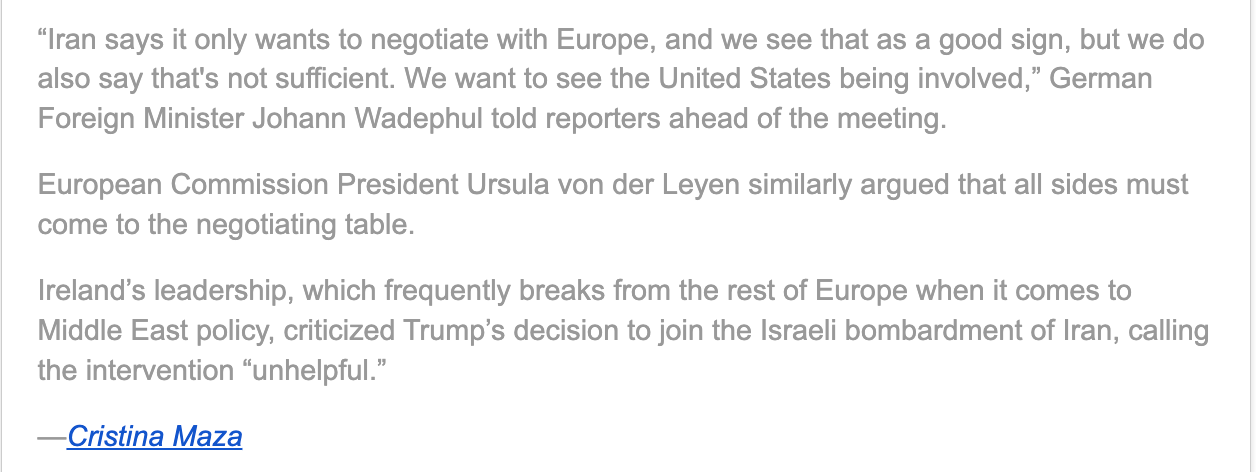I’ve had a busy week in Berlin, so this is just a quick note with some photos of my first time reporting from the Bundestag. All of the news I’ve been reading, some of which dominates the headlines and some of which doesn’t, is in the sections below.
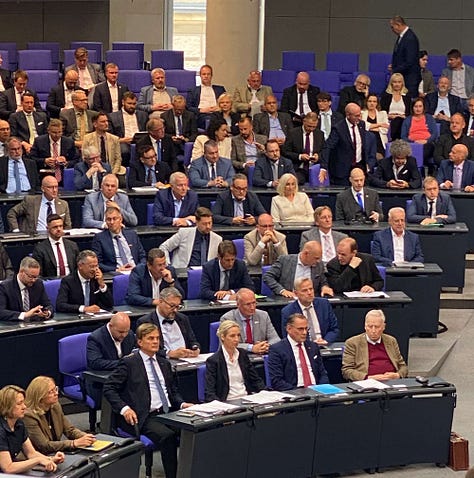
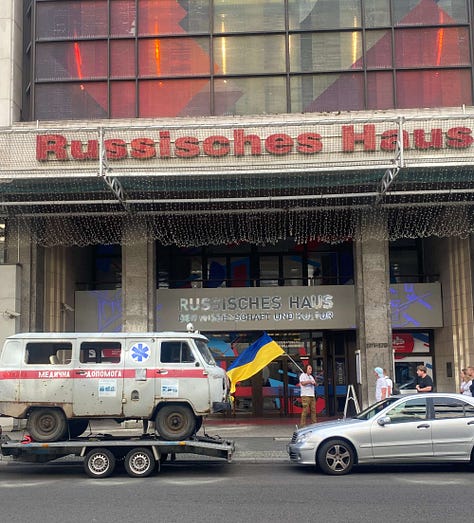


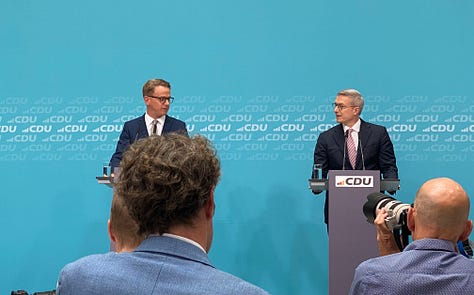
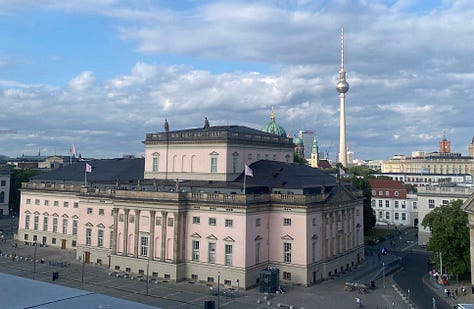


I’ll be back in Washington soon, and then I plan to publish a few more Lazo Magazine stories. I admit I haven’t been publishing at the pace I’d like. Life gets busy. I can only afford to hire a limited amount of help. If you’d like to support Lazo in any small way, that'd be greatly appreciated and would help me expand my little editorial project.
For the entire month of June, I am offering a significantly discounted rate for anyone who wants to become a paid subscriber of Lazo Letters: $25.50 per year, or just over $2 per month.
Lazo Magazine also has a Buy Me A Coffee Page, which allows you to make easy, one-off payments to support us with caffeine. ☕
My weekly news blurbs:
What I’m reading:
• Bloomberg did the math on what a war between NATO and Russia could realistically cost, and estimated that the global cost if Russian President Vladimir Putin were to invade, for example, the Baltic states, would be 1.5 trillion dollars in the first year, or a hit to global output of 1.3 percent.
• Ukraine and the Council of Europe signed an agreement forming the basis for the creation of a special tribunal for the crime of aggression against Ukraine, Reuters reports. Ukraine has demanded the creation of such a body since Russia's February 2022 invasion.
• The United Kingdom vowed to boost Ukraine’s air defense with hundreds of missiles, with the fresh military aid package being paid for with £70 million ($95.3 million) raised from interest on seized Russian assets, the Guardian reports. The package marks the first time the U.K. has used funds linked to Moscow to purchase weapons for Kyiv.
• Robert Fico, Slovakia's prime minister, confirmed that he would continue to vote down the next package of sanctions that the European Union wants to impose on Russia in response to the full-scale invasion of Ukraine. EuroNews has an explainer.
• The Latvian parliament voted to bar Russian and Belarusian citizens from buying real estate in the country, Politico Europe reports.
• Kosovo is preparing to receive deportees from the U.S. amid warnings that the Balkans could become a migrant “warehouse,” Radio Free Europe reports.
• Homeland Justice, a group with alleged ties to Iran’s Revolutionary Guard Corps, carried out a cyberattack against Albania, taking down the capital’s website and disrupting transportation, Politico Europe reports. The group allegedly conducted the attack because Albania hosts members of the Mojahedin-e-Khalq (MEK), a controversial group opposed to the Iranian regime.
• Hungary warned its EU partners not to attend this Saturday's Pride march in Budapest, authorized by the city's mayor, after European Commission chief Ursula von der Leyen called on authorities to reverse their ban on the event, France 24 reports. This year's celebration was banned as part of Prime Minister Viktor Orbán's crackdown on LGBTQ rights.
• Former Czech Prime Minister Andrej Babiš is in legal jeopardy again after Prague’s High Court overturned an earlier ruling clearing him of wrongdoing in a €2 million EU subsidy fraud allegedly linked to his agriculture business, Politico Europe reports.
• Inkstick Media has a report from the German border, where new controls are putting EU solidarity to the test.
• A court in Leipzig overturned a ban imposed by the German government on the far-right magazine Compact, the BBC reports. The German interior ministry banned the magazine in 2024 and described the publication as “a central mouthpiece of the right-wing extremist scene” that “incites unspeakable hatred against Jews, against people with a migration background, and against our parliamentary democracy.”
• A State Department delegation held talks with senior members of France’s far-right National Rally (RN) in late May, but the party rejected the State Department delegation’s offer of public support for its figurehead Marine Le Pen after a court barred her from holding office, Reuters reports.
• Dispatch has a lengthy investigation into how the London Council of Hackney is trying to cover up years of neglect in its public housing.
• VICE has a good photo essay on the wild youth of Belfast.
• The British government said it would ban the Palestine Action group and deem it a terrorist organization, three days after its members damaged military planes using red paint at Britain’s largest air force base, the New York Times reports. Palestine Action, which vandalized Trump’s golf resort in Scotland back in March, called the ban “unhinged” and said its lawyers “are pursuing all avenues for legal challenge.”
• Israeli Prime Minister Benjamin Netanyahu made plans to attack Iran last year, long before Trump initiated efforts to resolve nuclear concerns through mediation, the Washington Post reports.
• Iranian authorities carried out hundreds of arrests and multiple executions of people suspected of links to Israeli intelligence agencies in recent days and weeks, the BBC reports.
• In the hours after Israel launched its first wave of strikes on Iran on June 13, Israeli intelligence called senior Iranian officials on their cellphones and warned them that they would be killed unless they ended their support of Ayatollah Ali Khamenei’s regime, according to an audio recording obtained by The Washington Post.
• In the days before Trump gave the final order for the attack on Iran’s nuclear sites, Iran sent a private message to Trump saying that Tehran would respond to such a move by unleashing terrorist attacks on U.S. soil through the use of sleeper cells operating inside the country, sources told NBC News.
• Iran’s parliament has reportedly endorsed the closure of the Strait of Hormuz, a key waterway that around 20 percent of the world’s oil and gas shipments pass through, Iranian media reports.
• The U.S. military strikes on three Iranian nuclear facilities last weekend did not destroy Tehran’s nuclear program and likely only set it back by months, CNN reports.
• Iran’s stockpile of highly enriched uranium remains largely intact following U.S. strikes on the country’s main nuclear sites, according to preliminary intelligence assessments provided to European governments. The Financial Times has the headline.
• The Trump administration has discussed helping Iran access as much as $30 billion to build a civilian-energy-producing nuclear program, easing sanctions on Tehran, and releasing billions in restricted funds in order to bring Iran back to the negotiating table, CNN reports.
• Trump called for Israeli Prime Minister Benjamin Netanyahu’s long-running corruption trial to be “cancelled immediately” or for Netanyahu to be given a pardon, Axios reports.
• Local civilians kidnapped some 57 soldiers in the Micay Canyon area of Colombia, the BBC reports. The civilians are believed to be acting under pressure from the FARC rebel group, which had previously agreed to a peace deal with the government in 2016.
• At least 16 people were killed and over 400 injured during nationwide protests in Kenya, according to Amnesty International and other rights groups. The Kenyan police fired live rounds, rubber bullets, and tear gas, and sprayed water cannons at protesters.
You can write to me for any reason: c.maza@protonmail.com.






